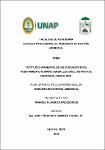| dc.contributor.advisor | Ramírez Chung, José Francisco | es_PE |
| dc.contributor.author | Macedo Rios, Francia Milagros | es_PE |
| dc.date.accessioned | 2022-10-14T16:03:00Z | |
| dc.date.available | 2022-10-14T16:03:00Z | |
| dc.date.issued | 2022 | |
| dc.identifier.uri | https://hdl.handle.net/20.500.12737/8432 | |
| dc.description.abstract | This research had the objective of studying environmental attitudes in the inhabitants
of the human settlement in 2021. The investigation, by its approach, was a
quantitative, forward-looking strategy, with a general descriptive level and nonexperimental
research design. The target population was 1556 inhabitants (1556) with
at least one year of residence and living in the area. The sample also consisted of
112 inhabitants who were present at the time of the application of the data collection
instrument, taking into account inclusion and exclusion criteria. The technique used
was the survey. The applied tool was the questionnaire with ten positive and negative
statements, which passed the validity (Aiken's validity index) and reliability
(Cronbach's alpha test) tests. The data obtained through the data collection
instrument was analyzed considering the research objectives and hypothesis and
subsequently expressed in a Basic Data Matrix (BDM) and analyzed, processed, and
tabulated through SPSS version 25. The results are as follows: 39.3% of the villagers
showed a favorable general environmental attitude being the predominant one
compared to the unfavorable attitude of 29.4%. Then, 56.3% of the villagers showed
a positive cognitive attitude. Also, 56.3% showed a favorable affective attitude
towards environmental conservation. 50% of the villagers showed a reactive
approach. According to gender, there was a predominance of positive attitude in both
with 57.1% and 42.9%. Likewise, according to the educational level of the inhabitants,
a predominance of favorable attitudes was found in the illiterate and primary education
levels. Whereas in the secondary and higher education levels, unfavorable and very
unfavorable attitudes predominated with 53.8% and 100%, respectively. | en_US |
| dc.description.abstract | El presente trabajo de investigación tuvo como objetivo estudiar las actitudes
ambientales en los pobladores del asentamiento humano en el año 2021. La
investigación, por su enfoque, fue cuantitativa, de estrategia prospectiva, de nivel
descriptivo simple y de diseño de investigación no experimental. La población
objetivo de estudio estuvo constituida por 1556 pobladores (1556) con un año mínimo
de vivencia y con vivienda en el lugar. La muestra igualmente estuvo constituida por
112 pobladores. La técnica que se utilizó fue la encuesta y el Instrumento aplicado
fue el cuestionario. Los datos obtenidos a través del instrumento de recolección de
datos, fue analizada teniendo en cuenta los objetivos y la hipótesis de investigación
y posteriormente expresados en una Matriz Básica De Datos (MBD) y analizada,
procesada y tabulada a través del paquete estadístico SPSS versión 25. Los
principales resultados expresaron que, el 39.3% de los pobladores mostraron una
actitud ambiental general favorable siendo la predominante en comparación con la
actitud desfavorable que obtuvo un 29.4% respectivamente, el 56.3% de los
pobladores mostraron una actitud cognoscitiva favorable, el 56.3% de los pobladores
mostraron una actitud afectiva favorable hacia la conservación ambiental, el 50% de
los pobladores mostraron una actitud reactiva. En las actitudes general y sus
componentes de acuerdo al GENERO, se encontró predominancia de la actitud
favorable en ambos GENEROS, con 57.1% y 42.9% en respectivamente. En la
actitud general y sus componentes en los pobladores de acuerdo al grado de
instrucción, se encontró predominancia de la actitud favorable en los grados de
instrucción primaria incompleta y primaria, pero en los grados de instrucción
secundaria y superior predominaron las actitudes desfavorable y muy desfavorable
con 53.8% y 100% en respectivamente. | es_PE |
| dc.format | application/pdf | es_PE |
| dc.language.iso | spa | es_PE |
| dc.publisher | Universidad Nacional de la Amazonía Peruana | es_PE |
| dc.rights | info:eu-repo/semantics/openAccess | es_PE |
| dc.rights.uri | https://creativecommons.org/licenses/by/4.0/ | * |
| dc.subject | Sensibilización ambiental | es_PE |
| dc.subject | Conocimientos, actitudes y prácticas | es_PE |
| dc.subject | Conservación ambiental | es_PE |
| dc.subject | Zonas rurales | es_PE |
| dc.title | Actitudes Ambientales del poblador en el asentamiento humano Versalles en el distrito de Punchana Loreto 2021 | es_PE |
| dc.type | info:eu-repo/semantics/bachelorThesis | es_PE |
| thesis.degree.discipline | Ingeniería en Gestión Ambiental | es_PE |
| thesis.degree.grantor | Universidad Nacional de la Amazonía Peruana. Facultad de Agronomía | es_PE |
| thesis.degree.name | Ingeniero(a) en Gestión Ambiental | es_PE |
| dc.subject.ocde | https://purl.org/pe-repo/ocde/ford#5.02.04 | es_PE |
| renati.author.dni | 70346640 | |
| renati.advisor.orcid | https://orcid.org/0000-0002-9952-1169 | |
| renati.advisor.dni | 05286297 | |
| renati.type | https://purl.org/pe-repo/renati/type#tesis | es_PE |
| renati.discipline | 521236 | es_PE |
| renati.level | https://purl.org/pe-repo/renati/level#tituloProfesional | es_PE |
| renati.juror | Vargas Fasabi, Jorge Aquiles | |
| renati.juror | Tello Fernandez, Ronald | |
| renati.juror | Romero Villacrez, Juan Luis | |
| dc.publisher.country | PE | es_PE |


